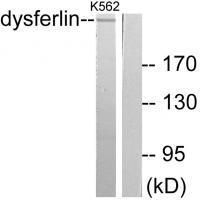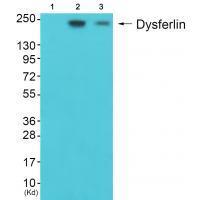

| WB | 咨询技术 | Human,Mouse,Rat |
| IF | 咨询技术 | Human,Mouse,Rat |
| IHC | 咨询技术 | Human,Mouse,Rat |
| ICC | 技术咨询 | Human,Mouse,Rat |
| FCM | 咨询技术 | Human,Mouse,Rat |
| Elisa | 咨询技术 | Human,Mouse,Rat |
| Aliases | dysferlin; limb girdle muscular dystrophy 2B (autosomal recessive); |
| Entrez GeneID | 8291; |
| WB Predicted band size | 240kDa |
| Host/Isotype | Rabbit IgG |
| Antibody Type | Primary antibody |
| Storage | Store at 4°C short term. Aliquot and store at -20°C long term. Avoid freeze/thaw cycles. |
| Species Reactivity | Human,Mouse |
| Immunogen | Synthesized peptide derived from human Dysferlin. |
| Formulation | Purified antibody in PBS with 0.05% sodium azide. |
+ +
以下是关于Dysferlin抗体的3篇参考文献及其简要概括:
1. **"Dysferlin, a novel skeletal muscle gene, is mutated in Miyoshi myopathy and limb girdle muscular dystrophy 2B"**
- **作者**: Liu J, Aoki M, Illa I, et al.
- **摘要**: 该研究首次克隆了Dysferlin基因,并发现其在LGMD2B和Miyoshi肌病中的突变。通过特异性抗体检测,证实患者肌肉组织中Dysferlin蛋白表达缺失,为疾病诊断提供了关键依据。
2. **"Characterization of monoclonal antibodies to dysferlin and their application in muscle pathology"**
- **作者**: Matsuda C, Hayashi YK, Ogawa M, et al.
- **摘要**: 研究团队开发了多种抗Dysferlin单克隆抗体,验证了其在Western blot和免疫组化中的特异性,并揭示了Dysferlin在正常肌肉膜修复中的定位,为病理诊断和机制研究提供了工具。
3. **"Comparative analysis of commercial dysferlin antibodies for diagnostic use in muscular dystrophies"**
- **作者**: Walter MC, Braun C, Vorgerd M, et al.
- **摘要**: 研究比较了多种市售Dysferlin抗体的敏感性和特异性,发现部分抗体在诊断LGMD2B中存在交叉反应,强调了标准化抗体验证对准确诊断的重要性。
Dysferlin antibodies are immunological tools used to detect dysferlin, a protein encoded by the *DYSF* gene, which plays a critical role in skeletal muscle membrane repair. Dysferlin is predominantly expressed in muscle cells and localizes to the sarcolemma, where it facilitates vesicle-mediated membrane resealing after injury. Mutations in *DYSF* cause dysferlinopathies, a group of autosomal recessive muscular dystrophies including Limb-Girdle Muscular Dystrophy Type 2B (LGMD2B) and Miyoshi Myopathy. These disorders are characterized by progressive muscle weakness, typically manifesting in early adulthood, and are often misdiagnosed due to overlapping clinical features with other neuromuscular conditions.
Dysferlin-specific antibodies are essential for diagnosing dysferlinopathies. Immunohistochemistry and Western blotting using these antibodies help identify reduced or absent dysferlin protein in muscle biopsies, distinguishing dysferlinopathies from phenotypically similar diseases like dystrophinopathies. Additionally, these antibodies are utilized in research to study dysferlin’s molecular interactions, membrane repair mechanisms, and potential therapeutic strategies, such as gene therapy or protein replacement.
The development and validation of high-specificity dysferlin antibodies remain crucial, as accurate detection is confounded by protein isoforms and cross-reactivity risks. Ongoing research aims to refine antibody-based assays and explore biomarkers to improve diagnostic precision and monitor treatment efficacy in clinical trials.
×